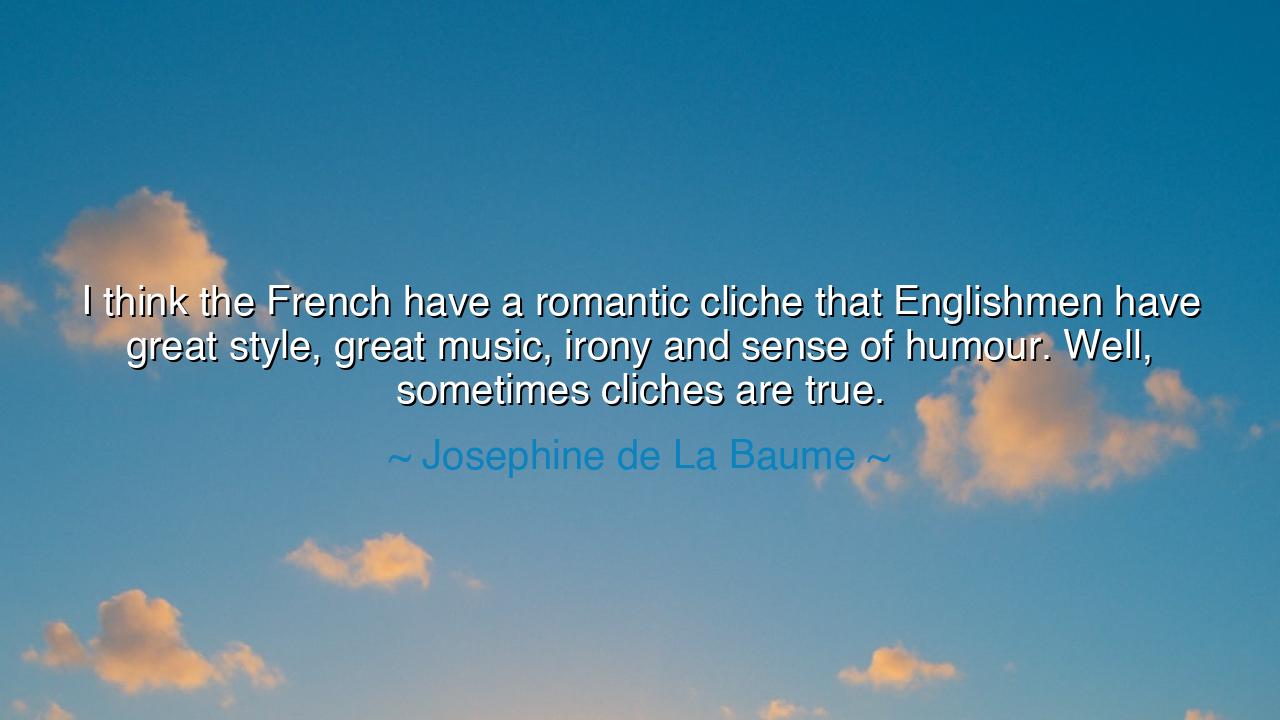
I think the French have a romantic cliche that Englishmen have
I think the French have a romantic cliche that Englishmen have great style, great music, irony and sense of humour. Well, sometimes cliches are true.






In the evocative words of Josephine de La Baume, "I think the French have a romantic cliche that Englishmen have great style, great music, irony and sense of humour. Well, sometimes cliches are true," we are invited to contemplate the power of perception and the eternal interplay between cultural identities. The notion that certain traits or behaviors are ascribed to entire nations—such as the English penchant for irony and wit, or the French love for romance and sophistication—is rooted in centuries of cultural exchange and stereotypes. Yet, within this playful recognition, there lies a deeper truth: sometimes, the very cliches that arise from these national characteristics do indeed reflect something genuine and enduring about the nature of a people.
The concept of cliches, while often dismissed as superficial or reductive, is rooted in the human need to understand and categorize the world. Ancient Greeks and Romans observed the people and lands around them, assigning qualities to different regions and nations. For instance, the Greeks saw the Spartans as embodiments of discipline and military might, while the Athenians were admired for their intellectual pursuits and love of philosophy. In much the same way, the French, with their deep appreciation for aesthetics and culture, found a certain appeal in the English character—a blend of refined style, wit, and an air of irony that set the English apart from other nations.
The English, with their history of satire, irony, and dry humour, have long been celebrated for their ability to convey deep truths through indirectness and sarcasm. From the wry commentary of Shakespeare, who used comedy to reflect the foibles of human nature, to the wit of Oscar Wilde, whose sharp commentary on society became his trademark, English writers have crafted an identity built upon the subtle play between truth and humour. Wilde, for example, remarked that "life is too important to be taken seriously," encapsulating the English spirit of irony—a trait that both disarms and enlightens. This tradition has carried through the centuries, from Jane Austen's satirical novels to the sharp commentary of modern English comedians.
However, the romantic cliche that Josephine de La Baume speaks of is equally true. The French, renowned for their love of romance, art, and elegance, have long been associated with an ability to infuse beauty and sophistication into every aspect of life. Whether in the intricate designs of Versailles, the haute couture of Paris, or the passionate literature of figures like Victor Hugo, the French have cultivated a legacy of romanticism—a dedication to beauty in its many forms. This romantic spirit is not confined to the arts but extends to the French understanding of life itself, where moments of beauty, love, and joy are celebrated as the highest of human pursuits.
What de La Baume highlights is the truth that cliches, often dismissed as mere stereotypes, can sometimes capture the essence of a culture or a people. Just as the Romans understood that the Greeks were the masters of thought and philosophy, so too does the world often recognize the English for their sense of humour and irony, and the French for their undying passion for romance and artistic expression. While these characteristics may not encompass the full complexity of these nations, they represent archetypes that resonate with the deeper truths of each culture’s identity.
The lesson here, however, goes beyond the acknowledgment of national stereotypes. It speaks to the human condition and the need to recognize the power of cultural identity—not as something static or limiting, but as a dynamic force that shapes the way people express themselves and interact with the world. The English, with their ironic wit, and the French, with their romantic spirit, embody timeless traits that continue to influence global culture today. By recognizing these cultural archetypes, we can learn to appreciate not only the richness of other cultures but also the unique ways in which our own identities are shaped by history, tradition, and perception.
In your own life, take time to reflect on the cliches and stereotypes that surround you. Do they reflect something deeper about who you are and where you come from? Rather than dismissing them outright, consider how these archetypes might serve as windows into the larger truths of human nature. Embrace the complexity of your own identity, acknowledging both the strengths and the contradictions that shape you. And, as you encounter the cliches of others, seek to understand the truths hidden beneath the surface, for it is in these shared perceptions that the beauty of cultural identity is found.






AAdministratorAdministrator
Welcome, honored guests. Please leave a comment, we will respond soon